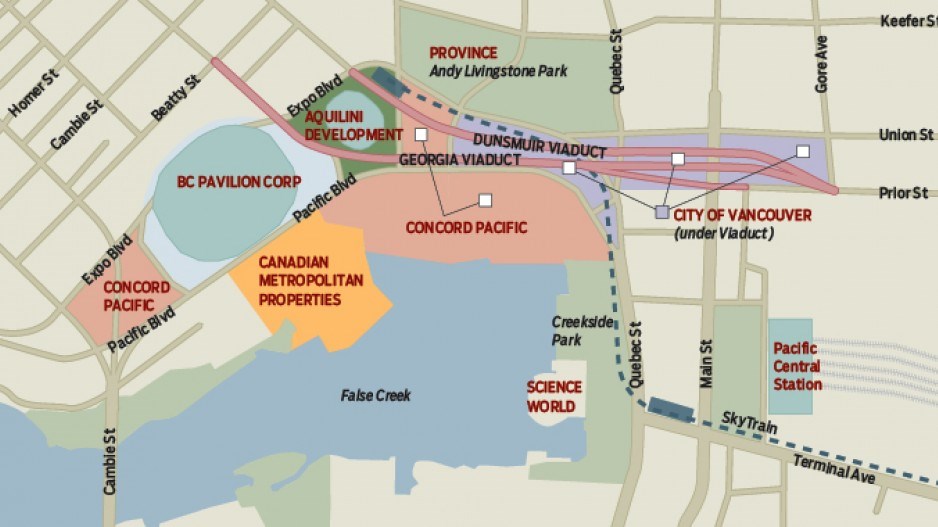Northeast False Creek landowners expect property values and quality of life to improve if the Vancouver demolishes the Georgia and Dunsmuir viaducts.
City council voted unanimously June 26 to direct staff to spend $2.4 million over two years probing the logistics of tearing down the 41-year-old elevated concrete expressways. A final vote on the $132 million proposal is not expected until June 2015.
Keeping the viaducts would come with costs for maintenance and seismic upgrades.
Removing the viaducts would add several acres to a nine-acre park that Concord Pacific has committed to build and free up seven acres of land in the two blocks between Quebec Street and Gore Avenue, where the city would develop commercial space and build 1,000 housing units.
At least 20% of those units would be earmarked for affordable, non-market housing.
"Viaduct removal is good for quality of life and that's good for property values," False Creek Residents Association co-chair Fern Jeffries told Business in Vancouver.
Increased property values and density would add revenue to the city from:
•property taxes;
•development cost charges; and
•other fees.
Councillor Geoff Meggs told BIV that the city is likely to generate within $20 million of the $132 million cost.
"As with any investment the benefits are as much intangible city-building assets in terms of economic development and quality of life as they are direct cash back to the city," Meggs said.
"But, in this case, we can see that under certain scenarios the city could recover a great deal of its cash back."
Developers such as Aquilini Investment Group (AIG), Concord Pacific and Canadian Metropolitan Properties Corp. (CMPC) – all of whom contributed to Vision Vancouver's victorious 2011 civic election campaign – would also benefit.
Concord Pacific, which owns the most private land in the area, would be the biggest beneficiary.
"The proposed street network and removal of the viaducts has significant positive impacts to Concord's lands," noted the June 18 staff report to council.
To ensure that Concord benefits from the viaducts' removal, the city and the company would be involved in a series of land exchanges to create additional development opportunities from the new road configuration.
Changes to land use will alter soil-remediation requirements and likely move the planned expansion of Creekside Park to a flatter site, which Meggs said would make it better for sports.
"At the Plaza of Nations, we're not as affected," said CMPC senior vice-president Daisen Gee-Wing. "For the land surrounding [the viaducts], there will be a much higher yield and higher use of the land so value should increase."
Gee-Wing's company is navigating the rezoning process to transform its Plaza of Nations by building:
•1.4 million square feet of residential space;
•350,000 square feet of commercial space; and
•amenities such as a National Hockey League-sized skating rink, child-care space and a community centre.
He doesn't expect the city to dole out extra density to CMPC or other landowners if it proceeds with the plan to knock down the viaducts.
"We've gone through an exercise with the northeast False Creek area plan," he said.
"A lot of density requirements have already been designated. Just because they decide to take the viaducts down, I don't think the city would revisit and look to capitalize [by designating new densities]. So there's nothing that we can do to effectively get more development on our site." •




